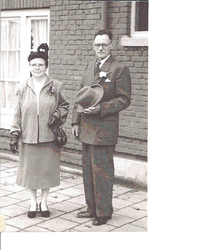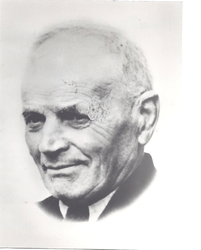A thank you to an old Dutch farmer
Michael Marmot’s Comment (Sept 18, p 1019) 1 made me think back to the fate of the Jews in occupied Holland. In April, 1942, all Dutch Jews were ordered to wear a yellow star over their hearts, on which in big, black, fancy, capital letters was printed the word JEW. Far from being a badge of honour, that first day I wore it on my way to school, one of the first to see it, a young woman in her mid 30s, started to cry. Men I had never met before, upon seeing me, silently tipped their hats in greeting. That and the first Gestapo roundup of all men aged 15 years or older they could catch that had preceded it, made the year 1942 far from uneventful. Where the basic requirements for a normal life are freedom and security, without them a normal existence is almost impossible. The insidious nature of the various incursions into our lives and the curtailment of our rights as free Dutch citizens were devastating. We were rapidly becoming outcasts. Forced to accept every new edict with its further, humiliating restrictions profoundly affected our sense of security, confidence, and self worth. We were told, in effect, that we existed outside the law and were treated like dangerous criminals even though we had never harmed anyone. We also experienced a loss of autonomy; we were no longer allowed to move about freely, bound as we were by severe travel and other restrictions. And ultimately we suffered the loss of dignity, the issue Marmot addressed, that for most who had never before experienced this feeling had a devastating effect. The worst part of the whole situation was that we could do nothing about it. There was nothing that anyone could do for these folks. Behaving like they were invincible, the Gestapo acted like disdainful supermen. And because we were powerless, for many the worst expectations became a self-fulfilling prophesy, since only a few people were willing to put their lives on the line and try to correct any wrongs. Yet in this way the Resistance was born when a handful of courageous men and women started a quiet rebellion. We ourselves, however, were helpless. There was no way to appeal the injustice; no recourse, no escape from it. We were like flies stuck to fly paper or mice caught in a mouse trap. The enemy held all the cards and guns, and didn’t mind using them. So from a free people we became pariahs, the kind of outcasts that anyone who wished could throw stones at or put against the wall and shoot them, and do it with impunity. And some did just that, by natural inclination. A few, fortunately, did not, but felt sorry for us and tried to help in any way they could, even at their own peril. I survived because a 72 year old, very courageous Dutch farmer and his family took me in and for almost 3 years gave me shelter. As I have lived my life we have seen the same inequities committed again and again in different parts of the world while the rest of the world has often stood by.
Henry Gans
1 Marmot M. Dignity and inequality.
Lancet 2004; 364: 1019–21. 2096 www.thelancet.com Vol 364 December 11, 2004
Michael Marmot’s Comment (Sept 18, p 1019) 1 made me think back to the fate of the Jews in occupied Holland. In April, 1942, all Dutch Jews were ordered to wear a yellow star over their hearts, on which in big, black, fancy, capital letters was printed the word JEW. Far from being a badge of honour, that first day I wore it on my way to school, one of the first to see it, a young woman in her mid 30s, started to cry. Men I had never met before, upon seeing me, silently tipped their hats in greeting. That and the first Gestapo roundup of all men aged 15 years or older they could catch that had preceded it, made the year 1942 far from uneventful. Where the basic requirements for a normal life are freedom and security, without them a normal existence is almost impossible. The insidious nature of the various incursions into our lives and the curtailment of our rights as free Dutch citizens were devastating. We were rapidly becoming outcasts. Forced to accept every new edict with its further, humiliating restrictions profoundly affected our sense of security, confidence, and self worth. We were told, in effect, that we existed outside the law and were treated like dangerous criminals even though we had never harmed anyone. We also experienced a loss of autonomy; we were no longer allowed to move about freely, bound as we were by severe travel and other restrictions. And ultimately we suffered the loss of dignity, the issue Marmot addressed, that for most who had never before experienced this feeling had a devastating effect. The worst part of the whole situation was that we could do nothing about it. There was nothing that anyone could do for these folks. Behaving like they were invincible, the Gestapo acted like disdainful supermen. And because we were powerless, for many the worst expectations became a self-fulfilling prophesy, since only a few people were willing to put their lives on the line and try to correct any wrongs. Yet in this way the Resistance was born when a handful of courageous men and women started a quiet rebellion. We ourselves, however, were helpless. There was no way to appeal the injustice; no recourse, no escape from it. We were like flies stuck to fly paper or mice caught in a mouse trap. The enemy held all the cards and guns, and didn’t mind using them. So from a free people we became pariahs, the kind of outcasts that anyone who wished could throw stones at or put against the wall and shoot them, and do it with impunity. And some did just that, by natural inclination. A few, fortunately, did not, but felt sorry for us and tried to help in any way they could, even at their own peril. I survived because a 72 year old, very courageous Dutch farmer and his family took me in and for almost 3 years gave me shelter. As I have lived my life we have seen the same inequities committed again and again in different parts of the world while the rest of the world has often stood by.
Henry Gans
1 Marmot M. Dignity and inequality.
Lancet 2004; 364: 1019–21. 2096 www.thelancet.com Vol 364 December 11, 2004
These courageous Dutchmen will be remembered for their heroism.
|
The Bosman family who took in my parents during the war and kept them safe for 32 months.
|
Hendrik Jan Smeenk, who together with his
daughter and son-in-law provided me with a safe place for 32 months. |


